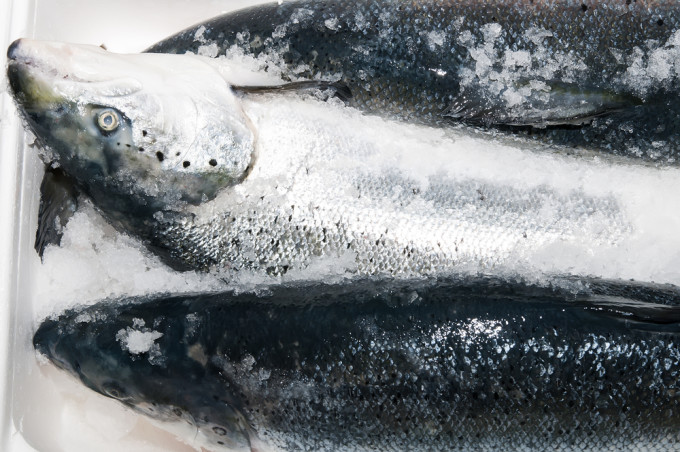A Guessing Game for Consumers
When it comes to fresh or frozen fish, eagle-eyed shoppers will, however, have a few clues with which to work. Because the AquAdvantage salmon will be raised in Panama, it will have to carry the country-of-origin (COOL) label required by the U.S. Department of Agriculture (USDA). These rules also require imported fish sold by retailers to be labeled as “farm-raised” or “wild caught.” So if shoppers see “farm-raised” and “Product of Panama” all on one package, the salmon could well be genetically engineered by AquaBounty.
Right now, Center for Food Safety policy analyst Jaydee Hanson says, “no other salmon is being raised commercially in Panama.” But there’s no guarantee that will remain the case.
Fish that has been processed—cooked or combined with other ingredients in a product like a frozen entrée with sauce or a salmon burger—has another set of labeling rules entirely. Salmon in these forms are exempt from COOL requirements. So are restaurants and what the USDA calls “food service establishments,” like cafeterias. The agency explains that while restaurant suppliers must make country-of-origin information and farmed or wild caught information “available” to their buyers, the restaurants themselves are not required to share this information with their customers.
Either way, if the FDA’s proposed voluntary labeling guidelines are approved, Just Label It executive director Scott Faber says, “consumers will have no way of knowing whether the salmon they are buying comes from nature or from a lab.”
AquaBounty maintains, however, that their GE salmon will be “traceable.”
The Lawsuits
The FDA has rejected petitions from Food &Water Watch asking that GE salmon be considered under food additive regulations rather than animal drug laws that it has used for this approval. The FDA has also rejected a Center for Food Safety (CFS) petition asking that labeling be mandatory for all food containing GE ingredients. CFS says it will bring a new lawsuit against the FDA for its approval of AquaBounty’s GE salmon. Other groups, including Food & Water Watch, are also considering legal action.
“We recognize that some consumers are interested in knowing whether food ingredients are derived from GE sources,” said Susan Mayne, director of the FDA’s Center for Food Safety and Applied Nutrition, in a statement. But so far, FDA is leaving this up to manufacturers and setting strict rules for companies claiming to be GMO-free.
Is GE Salmon an “Animal Drug”?
On a technical note, AquaBounty’s salmon was approved through legal maneuvering under the federal Food, Drug, and Cosmetic Act that has allowed the GE salmon to be approved as an “animal drug.” And it turns out, this could further obscure what the public knows about GE fish—or other GE food animals that may eventually be approved.
“Lawyers at FDA figured out they could use the definition of a drug in the Food, Drug, and Cosmetic Act, [which says] a drug involves any substance that is intended to change the structure or function of an organism,” Dartmouth College professor of environmental studies and Union of Concerned Scientists board chair Anne Kapuscinski explained to Civil Eats. “They said, ‘we could stretch that to cover the transgene inserted into an animal whose intent is to change the function of the organism.’”
Why does this matter to general public? Because the Food, Drug, and Cosmetic Act “requires the FDA to keep the entire drug application process secret unless the applicant wants to make it public,” Kapuscinski explained. In the case of the AquaBounty GE salmon, the process was made public, but “that doesn’t mean others will be,” she said.
“The concern is about future applications. If they’re secret, how are we to know if the FDA is going to maintain adequate scientific rigor for assessing environmental risks,” Kapuscinski said.
There may indeed be other GE animals in the pipeline. For example, research is also apparently underway for a genetically engineered pig. In that case, scientists hope to reduce the animal’s odor and alter its taste.
Kapuscinski and colleagues have submitted extensive comments to the FDA pointing out environmental concerns, including potential gaps in information about how the GE salmon will be kept contained in Panama. According to the FDA, both Canadian and Panamanian facilities have numerous measures to prevent eggs or fish from escaping. In addition, the fish “produced for food in Panama will be an all-female, reproductively sterile population.”
In addition, Hanson points to inadequacies in the food safety review process. These include concerns about the small number of samples put through safety tests, including those for potential allergens.
Of course, retailers’ willingness is another important piece of the puzzle. Several including Costco, Safeway, and Kroger have said they have no plans to sell the AquAdvantage salmon. Other supermarket chains and retailers, including Target, Whole Foods, Trader Joe’s, and Aldi have made similar announcements. Last week, Walmart—a likely candidate—said it was too busy with “Black Friday” planning to comment.
Advocates are also concerned about the precedent this approval sets. Although the U.S. is the first nation to approve the salmon, Food and Water Watch’s Lovera says, “We’re very concerned about foreign markets. A lot of people take the FDA as a green-light.”
The FDA’s proposed voluntary guidelines on labeling for both GE salmon and other GE foods is open for public comment for 60 days beginning November 23rd.
